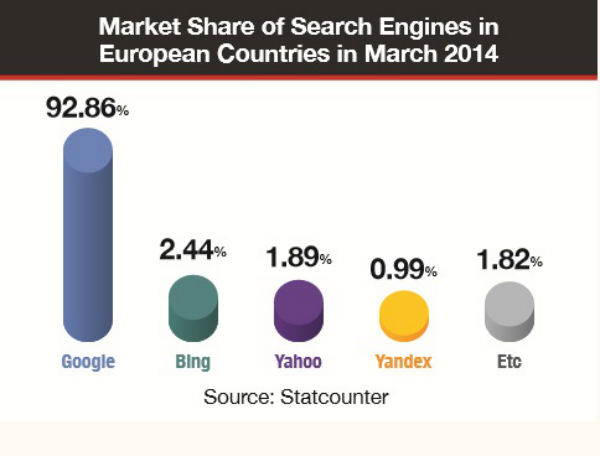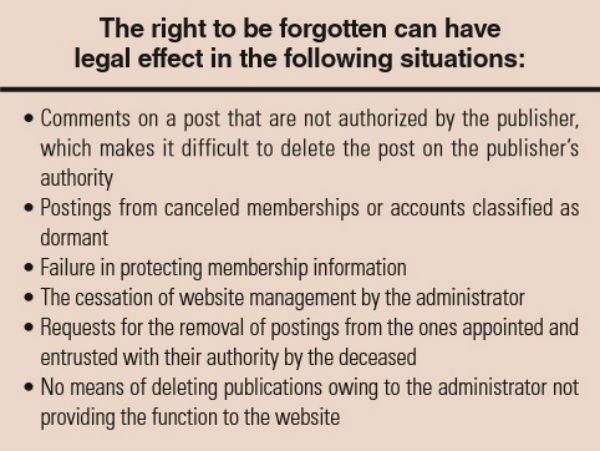Recently, people in Korea often use the term “black history” to indicate a certain point in the past that they want to change or get rid of from their mind. Because all humans are incomplete, there is no one living life without regrets about their past. Reflecting people’s long-cherished desire to hide and erase their unwanted bygones, the concept of the right to be forgotten has emerged, becoming a hot issue in today’s society. Korean society is no longer an exception to this trend. In this article, the Sungkyun Times (SKT) examines the concept of the right to be forgotten, highlights the arguments surrounding it, and explores possible ways to sensibly fulfill it.
What Is the Right to Be Forgotten?
According to the Court of Justice of the European Union (EJCU), the right to be forgotten can be defined as “the right -under certain conditions- to ask search engines to remove links with personal information about them.” This applies to situations where the information is inaccurate, inadequate, irrelevant, or excessive for the purpose of data processing. The needs to introduce this right mainly come from a sharp conflict of opinion between individuals and Internet corporations. Despite the fact that personal information is owned by individuals, they do not have full control over deleting their private matters, but rather the Internet corporations or website owners. Therefore, the key point of this right is to enforce the people’s right to “informational self-determination,” which is the right empowering individuals to decide the time and the extent to which their personal information can be revealed and used. Because of many people being tormented or witch-hunted by their past behaviors, it tries to prevent them from living with stigma for the rest of their life caused by a single mistake of the moment. The intellectual origin of the right comes from the French phrase, “droit a l’oubli” (right of oblivion), a law created to assist the rehabilitation of convicted criminals. This regulation allowed criminals to make objections against the details of a conviction and incarceration being published after serving their prison time. The more recent debate surrounding the right to be forgotten began in 2012. It was when Mario Costeja Gonzalez, a Spanish lawyer, asked Google to remove his personal information, which was about financial difficulties in the past.

After a long trial of four years, the final decision of the European Court of Justice (ECJ) was on the side of Gonzales. On January 25, 2012, the opinion was given full legal effect when the European Commission established the General Data Protection Regulation, and it has been expanding its influence ever since.
The Current State of the Right to Be Forgotten
• Worldwide
At present, mainly European Union (EU) member states are taking the lead in protecting and enhancing the right to be forgotten. On the other hand, the United States (US) has shown relatively passive responses to this issue. This divergence in opinions mainly comes from the different values they pursue. While European countries put an emphasis on the protection of private life, the main interest of the US is the mobility of information, which can be restricted by the right to be forgotten. Nevertheless, there are much more practical reasons related to interests behind this matter. Currently, about 97 percent of European search engines are occupied by American companies such as Google and Yahoo.

Therefore, the two parties, the US and European countries, are experiencing increasing information discrepancy, as the US has gained supremacy by obtaining an immense database of Internet users. Given that broad intelligence networking is appreciated as a new, important component of national competitiveness, this phenomenon can be a serious threat to European countries. In summary, from the political point of view, moves in favor of the right to be forgotten can be also interpreted as European countries attempting to hold the US in check, preventing American Internet corporations from expanding any further.
Despite the sharp conflict surrounding it, attempts to introduce the right to be forgotten have been constantly growing on a global scale. Google is the main search engine participating in the change, announcing that they would increase a range of applications of the right to be forgotten to all European countries last February. Prior to this announcement, only internet users from the United Kingdom (UK) and France were allowed to send requests for the removal of their personal information. Lately, Japan has also reached a verdict of recognizing this right for the first time. In December last year, the District Court of Saitama accepted an injunction request of a child sex offender asking to eliminate articles about his conviction from search results. Considering that the discussion on the right to be forgotten had been consistently centered around the UK and the US, this change is meaningful in that it shows the right to be forgotten is starting to draw attention in other countries.
• Korea
In Korea, the right to be forgotten was first acknowledged at the local community level. Last January, Gangwon-do, one of the eight administrative districts in Korea, made posts on its official website to be deleted automatically after certain period of time by setting an expiration date on data. Later on, the right to be forgotten has been introduced across the nation with the Korean government’s announcement of the “guideline for request of exclusion of approach” on March 25 of this year. According to the guideline, all internet users except corporations can request to hide their posts, and every internet service provider is encouraged to follow this guideline.

Once the identification process is complete, the administrator of the server either removes posts from search results or blocks the posts. In other words, it only hides information from others rather than deleting it completely, since there is a possibility of a false report by others. Finally, claimants will be notified whether their requests have been granted or not via mail or email. Nonetheless, this guideline only lets people delete posts written by themselves, not by third parties. As a result, some people criticize that the government has failed to fully implement the right to be forgotten. Furthermore, the guideline has another limitation in that it has no legal force.
Not surprisingly, major internet portal companies strongly oppose the government’s decision, as it may restrict their autonomy and force them to spend enormous efforts and resources. Jae Pil Cha, the Policy Director of the Korean Internet Corporations Association, said that, “The guideline will just cause conflict between Internet users and providers of web browsing services and also can result in deterioration of search engines.” Consequently, without any cooperation from major internet portal companies, considerable difficulties are expected in introducing and implementing the guideline to the Korean society.
Some Existing Points of Controversy Regarding the Right to Be Forgotten
• Conflict Between Two Basic Rights
One of the biggest problems yet to be solved when introducing the right to be forgotten is the conflict between two basic rights - privacy rights and the freedom of expression. The intention to protect one’s dignity is admirable, but the right could block or delete other’s postings without their permission. This is also closely related to the right to be informed. Since unrestricted communication is an essential element in a democratic society, this can be regarded as a retrograde step. The People’s Solidarity for Participatory Democracy (PSPD), one of the biggest nongovernmental organizations (NGOs) in Korea, said, “It is undesirable to restrict the spread of information without considering the fact that others can be in urgent need to obtain that information.” Despite these opposing voices, the Korean public seems to be leaning toward privacy protections. According to a survey by the National Information Society Agency (NIA), almost six out of ten Internet users responded that they think the privacy right is more important than freedom of expression.
• Problems in Effectiveness
Some people have also raised questions on whether the right to be forgotten is truly achievable. Openness, one of the typical traits of the Internet, allows people to copy and modify information freely and increases the speed of spreading information beyond our imagination. Therefore, once certain data are uploaded on the Internet, tracking all information and completely removing it is virtually impossible due to current technical limitations. Even if all information is discovered, there is another matter left: the current law does not clearly state who owns reprocessed information. Therefore, whether the ownership belongs to the original provider of information or to the person who has modified it is a further controversial issue.
• Possibilities of Misapplication
The right to be forgotten can be abused as a method of wrongful censorship as well. Some concern that it will only be a method of rationalization for those who are well-informed and powerful enough to take full advantage of the law. There is a voice saying that information on the identity of a serious criminal or of corrupt politicians should be disclosed for the public’s sake. Particularly news articles, as time proceeds, hold high value as historical records. If these records can be arbitrarily erased by authority, historical distortion may take place through massive censorship.
Ideal Direction to Introduce the Right to Be Forgotten in Korea
First, forming a clear social consensus is required. Through an open forum including people from all walks of life, a guideline should be provided that clarifies the exact range of personal information and the people who are subject to this regulation. In short, the guideline should take consideration of diverse perspectives of providers, users of information, and Internet service providers and successfully integrate all of them.
Secondly, protection of privacy and freedom of expression may reach a compromise by constituting an information restoration committee. If some people think it is unfair for their posts to be blocked, they should be guaranteed the right to make a formal objection to re-examine the case to judge whether it is reasonable or not. In other words, the committee should give people an opportunity to bring back their information sources that have become inaccessible without their consent. Since both rights are fundamental in people’s lives, this compromise plan should be discussed in a very delicate way. The information restoration committee can be a good way to balance the two rights because it considers the possibility of wrongful deletion of information.
Finally, administrative supports should be introduced with the guideline. Even after the introduction of a guideline, the public may still experience difficulties with applying it in detail or have some questions about the process their information will go through after requesting to delete something. If a public institution takes full charge of the application for the related service, the public will be much more comfortable in asserting their right to be forgotten, and more feedback will be available through communication. Furthermore, the intervention of governmental authority also makes the guideline more compulsory, which will lead to higher feasibility of the policy. Although the “118 center” is now operated by the Korean Internet & Security Agency (KISA) to protect individual information, it deals with broader cyber matters such as cyber terrorism. Therefore, it is crucial to develop a public institution working as a control tower specialized in protecting the right to be forgotten.
The Internet has increased both the amount and the period people can remember to infinity. As the quote, “The Internet never forgets” implicates, unconditional accumulation of information is emerging as a new concern of modern people. Although the right to be forgotten suggests a decent solution to solve this situation, a cautious approach is needed while introducing it in our society. Hopefully, this right will be well-balanced so that it can satisfy all society members.
